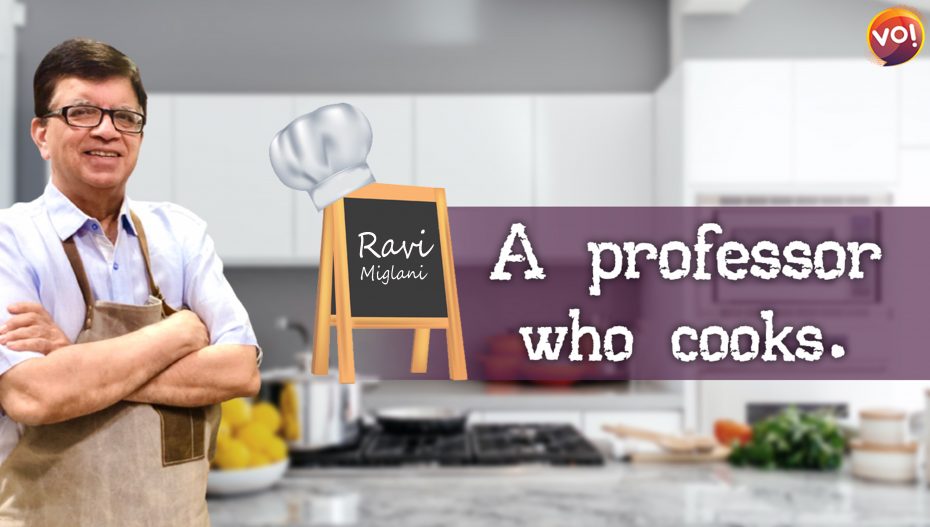Define cooking. You start with some base ingredients – say, vegetables, dal, rice, meat. Into these base ingredients go some additives – say, oil, salt, spices, condiments. The defining transformation happens when heat is applied to the ingredients and the additives. So, cooking is a simple combination of three factors: the base ingredient, the additives, and heat.
The ingredients, additives, and heat do a little secret dance, and out comes a delicious dish. Simple. Or is it? We are missing a key factor: Time. The ingredients, additives, and heat interact with each other over time. The transformation depends on how much time the additives spend with the ingredient, and how much time they spend with heat.
We don’t often think of time as an ingredient in cooking. In these days of fast life and fast food, we think we are being smart when we do more in less time. But taking half the time out of cooking – for example, by cooking quickly on high heat – is like taking half the salt out or half the oil out. Will your dish taste as delectable with half the required amount of salt or oil? Ingredients need time, on low heat, to slowly reveal their hidden potential. A dal makhani needs to simmer for an hour for the natural cream hidden inside the urad bean to bloom.
You cannot force it. Potatoes need to roast an hour for the outside to get crisp and the inside to go all pulpy and creamy. Without adequate time, you can make edible food, but not magical. Time brings the magic out. The villain of the piece, robbing ingredients of the time they need to bloom, are these so-called fast cooking devices like pressure cookers (and their fancy cousins like instant pots).
Smash your pressure cooker. Pro tip: pressure cookers make quaint plant pots on your balcony. I know, in Indian kitchens the pressure cooker is king. No cooking session starts without at least something going into the pressure cooker, for two whistles, or twenty. The noisiest and scariest device ever invented. Boil your dal in an open pot. Yes, it will take three times as long. So what? Remember, time is an ingredient. If the dal wants an hour to slowly simmer for its magic to manifest itself, then respect that dal’s wish.
Who are we to tell the dal to do its trick in 20 minutes? At a classical music recital, would you ask the singer to do her alaap at 3x speed so you can get the piece done in 20 minutes instead of the hour that the raag needs to reveal its beauty? Would you jog through an art gallery, cursorily waving at each masterpiece? Our obsession with speed, with efficiency, has crept into our kitchens. We pray at the altar of efficiency, not creativity.
Slow down, smell the roses. Let the dal boil for an hour, do other prep meanwhile, spend time with the family, listen to music, read a book, go for a walk. Do not be disrespectful to the dal by throwing it into a pressure cooker. You can hear the distress of the dal through those soul-destroying ‘whistles’ of the monstrosity. They deceivingly call it a whistle.
That is not a whistle; you whistle a love tune on a verdant mountainside. Those are blood-curdling screams for help from the defenceless dal, being tortured in that pressurised hellhole. Show some love. The sublime dal makhani, cooked in an open pot for an hour, is a piece of art, not the dull soulless dal that has survived third degree in that torture chamber, the pressure cooker. Fast food is overrated. Slow food is good food.
This Professor Cooks. And talks about food ideas, food science, food culture, food hacks, and food history. Watch this space for some food and a lot more food for thought. Ravi Miglani is a home cook and consumer insights professional. Following a corporate career spanning eight countries and three decades, he is now a professor at Ahmedabad University (when he is not cooking).












A beautiful article, Ravi – never mind you (rightfully) massacred the popular Pressure cooker. Base ingredients, additives, heat and time – all very “Quant” aspects. Where is that hidden and elusive ingredient called “love” that brings in the real transformation of dishes? I doubt whether a robot programmed on all the “quant” aspects can give my favourite dish the magic taste that my wife or mother impart to it. Is love a psychological ingredient, or does it set the right context to savor the dish, or does it get translated into a quant aspect such as time? I dont know.